In the ever-evolving landscape of video game development, the emergence of creative talent is both thrilling and daunting for fans. Enter “Guns Undarkness,” an upcoming turn-based RPG that melds elements of sci-fi and war in an intriguing post-apocalyptic setting. This ambitious project is helmed by Shoji Meguro, renowned composer of the “Persona” and “Shin Megami Tensei” series, who forays into game design with this title. Partnering with him is Ilya Kuvshinov, celebrated for his stunning character illustrations in “Ghost in the Shell: SAC 2045,” as well as Lotus Juice, a well-known rapper synonymous with dynamic soundtracks in various iterations of the “Persona” series.
The collaborative pedigree of the team has led to heightened expectations regarding the game’s aesthetic and auditory experience. However, the pressing question lingers—what can players expect in terms of gameplay mechanics? While Meguro’s musical prowess is widely acknowledged, decoding his potential as a designer of tactical combat systems presents a conundrum that critics and fans alike are eager to unravel.
Set against the backdrop of 2045, “Guns Undarkness” transports players to a world grappling with the fallout of a nuclear conflict. The narrative teases a grim societal landscape characterized by stark divisions, suggesting an exploration of themes like wealth disparity and technology’s role in human connections. According to the game’s premise on Steam, a period of technological advancement led to a profound rift between the affluent and the impoverished, which sets the stage for philosophical inquiries about humanity’s future in a shattered world.
The game’s narrative parallels real-world concepts, notably the “Great Reset”—an initiative associated with the World Economic Forum. In-game, this concept takes on a more sinister guise, with disenfranchised “primitivists” inciting catastrophic change through a global nuclear uprising. This provocative storyline raises pertinent questions about power dynamics and personal agency, providing fertile ground for thought-provoking player interactions.
Yet, this subtext must be handled delicately; the line between commentary and insensitivity can be thin, especially in a medium that captures contemporary societal concerns. While Kojima’s “Metal Gear Solid” series has famously navigated such territory, Meguro’s ability to tread this path remains uncertain.
Now, shifting to the game’s mechanics—here, the design choices could either engender a compelling experience or crumble under scrutiny. Players will take command of a four-member squad, each with their own unique abilities. The layout of combat is reminiscent of tactical shooters; players use environmental cover to initiate conflicts, creating a strategic prelude to turn-based skirmishes.
Battles consist of two core elements: standard attacks, which offer tactical utility without resource expenditure, and skills that require action points for execution but can yield significant advantages. Particularly unique is the cover mechanic, which allows players to unleash skills without point depletion if they remain concealed. Furthermore, the mechanic of ducking into cover after targeting enemies’ weaknesses encourages a dynamic approach to combat, affording players flexibility in a turn-based setting.
Additionally, “Guns Undarkness” introduces an intricate reputation system akin to “Persona,” where character relationships flourish through cooperative combat. This system not only adds depth to the character development but unities narrative and gameplay elements, fostering a sense of camaraderie among the squad.
Ultimately, the true test of “Guns Undarkness” will lie in its execution. While the conceptual blend of poignant narrative, engaging gameplay mechanics, and visually striking artistry is undoubtedly appealing, players will remain vigilant for nuanced storytelling devoid of unintended ideological implications. As expectations mount for a release slated sometime this year, the gaming community eagerly anticipates whether this venture into the realm of tactical RPGs can deliver both emotionally and mechanically, ultimately paving the way for a new evolution in the genre.
Guns Undarkness stands at an intersection—a creative vision seeking to explore profound themes through a lens of gameplay innovation. Whether this ambitious project will resonate with audiences or get mired in controversy remains to be seen.


Leave a Reply